I moved this blog
I’m on Substack now
Still free and everything, but Substack is a little easier for me.
I’m on Substack now
Still free and everything, but Substack is a little easier for me.
Today is day 17 of a four-day lockdown. Lots of extra time on my hands means time to devote to my hobbies. This week I combined two of my hobbies, learning Chinese and web programming, to make a new flashcard app.
If you are learning Chinese, chances are that you’re using an app called “Pleco.” It’s a great dictionary app, really the gold standard of Chinese dictionary apps. And it’s loaded with features like live OCR, animated character drawing, and flashcards. I’ve been a happy user of Pleco for over ten years.
One of my many personality quirks is that I am a collector. The Chinese language, with tens of thousands of unique characters, is a hoarder’s dream nightmare. I have many, many “collections” of words that I’ve come across, and want to remember. When it comes to saving Chinese characters for later reference, I’m like that eccentric person who keeps every newspaper and magazine he’s ever bought, for years and years, cluttering up his house, just in case I want to read them later. Pleco enables this quirk with the function to create custom collections of words that you can review later, using the flashcards app. I have many, many collections.
I diligently organize my collections of Chinese characters, but each collection has hundreds of characters in it. If I use the flashcards function, it can take too long to get through a whole stack. Sometimes I have a few minutes, and want to spend it reviewing some of my collections. With Pleco’s flashcard system, you have to do the whole collection, no matter how many words it contains. It’s too cumbersome.
So I made my own flashcard app, that imports cards made with Pleco, and makes custom stacks of words to review. I call my creation Plestacks.

Plestacks is a web app; you can use it on a phone or a desktop computer. If you don’t use Pleco, then it’s pretty useless for you. I estimate that about seven people in the world will find this useful. However, I am one of those seven people, and in the immortal words of Dr. Frank N. Furter:

This was a fun project. I learned some new database functionality of modern web browsers, and applied some new web programming skills that I’ve been learning. If you’re a learner of Chinese and a user of Pleco, feel free to use Plestacks. You can access the program here: https://plestacks.denniehoopingarner.com/.
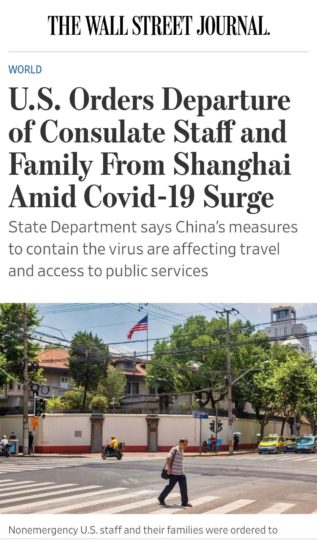
Today is Day 13 of a 4-day lockdown. The lockdown has limited the availability of food and access to quality health care. We’re fine for now, but the situation is unstable, changing every day.
A few days ago, the Department decided to put the Consulate on “Ordered Departure.” When a post goes on Ordered Departure, American personnel who aren’t performing a “mission-critical” function, especially those with families with small children, must leave. They have to return to DC, and work remotely (as best they can) from (cramped and crappy) hotel rooms until this is over.
We lived through this two years ago in Dhaka. We had the choice to leave then, and we chose to stay. We felt less vulnerable, and more importantly, we felt that we could help. Looking back, I feel that we made the right decision. We did some amazing work then; we really helped a lot of people. I feel the same way this time. Our core mission in Embassies and Consulates is to help American Citizens who are in need.
Ordinarily, my position here in Shanghai is not considered to be mission-critical. Cultural programming is the last thing on anyone’s mind when the city is shut down and under a cloud of uncertainty. Under Ordered Departure, I would be ordered to leave.
We did a lot of thinking about the situation, and decided that it made more sense for us to try to stay. We can be useful here. My wife already works in the Consular section. Several months ago, before any of this started, I asked for and received authorization to perform consular functions in Shanghai, everything from notarial services to adjudicating visas to American Citizen Services. At the time, I thought maybe I could help during the summer visa rush, when tens of thousands of students apply for visas to study in the United States. I told post leadership that we would like to stay and help, if they need two extra pairs of hands. As it happens, so many officers in the Consular section must leave, that they’re short-handed.
Consulate leadership accepted our offer to stay and help. So instead of evacuating to “safe haven” in the United States, I will be detailed to the Consular section, for as long as Ordered Departure lasts (anywhere from a few weeks to a few months).
We are aware of the potential dangers that we face by staying, but I’m not convinced that it’s as dangerous for us as it might be for others. We are physically safe. Violent crime is extremely rare, even crime of opportunity is low. The national surveillance system in China is like something in a George Orwell novel. It’s pretty hard to get away with crime here.
We do face two real threats by staying, though: food and medical care. Because the city is locked down, we can’t go to the grocery store. We are in a better , though, because we speak Chinese. My wife is on the cell phone all day, monitoring “group buys” of food. Unlike some other people, we have plenty of food. The food threat isn’t as serious for us (at least, not yet). Our food situation is much, much better than many people in the city.
Medical care is a larger problem. Hospitals are reluctant to admit anyone, for fear of spreading the virus. There are real stories of patients being refused service because they were running a low-grade fever, which of course is one of the symptoms of COVID. If we have a serious medical issue, it will be harder to get treatment. Harder, but not impossible. A guy in our building cut himself badly a few days ago while chopping vegetables in his kitchen. The building management managed to get him to a hospital and he got stitched up. There were some delays, but not too much.
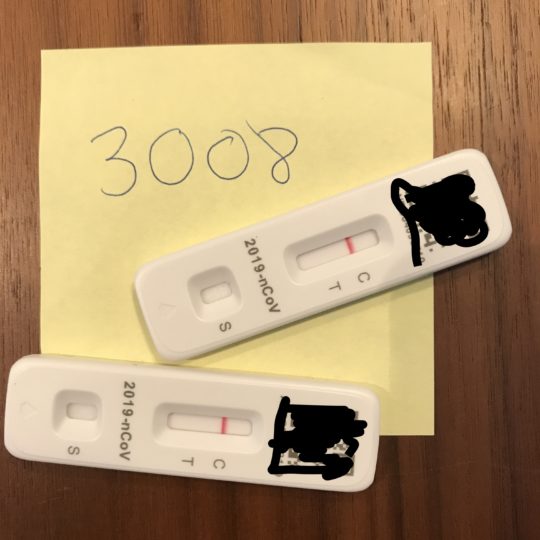
The city-wide lockdown continues, we haven’t been out of our apartment since April 1, except for three short trips out to a central testing site nearby. We don’t know when we will be able to leave. For now, “helping” means reading my work emails and waiting to be called. I think the Consular section will get more busy later on. After the lockdown is over, it will take some time for the officers to return to post. In that time window, the section will need our help to perform routine Consular services.
We’re fine for now. We are practicing what the Department calls “situational awareness.” We’ve been through this before, and this time we have the advantage of no language barrier. We’re in good health, and unlike last time, we’re triple-vaccinated. I think this will end much sooner than the Department predicts. I could be wrong, but I’m pretty sure that I’m right. In the meantime, there are some frightened Americans in Shanghai who don’t have the same support network and diplomatic immunity that I have. We can help these folks, this is what I signed up for, this is what I want to be doing.

It’s also something that I didn’t expect to see in China, least of all in Shanghai.
Today is day seven of a four-day lockdown, and no end is in sight.

I wasn’t surprised that the lockdown didn’t end on schedule. No one I know was surprised. This is Omicron, and we saw what it did to the rest of the world. We knew it would come to China, and we knew that it would be this hard to control. The number of new infections is still rising, and the official narrative is still couching the situation as a “war.” And wars must be won. They can’t be lost. For Shanghai, that means continued lockdown, continued testing (we have tested four times already), and waiting for the numbers to go down.
When you can’t go outside your apartment, you can’t buy groceries. We are fine, we have plenty of food. We were advised to store enough food to last up to two weeks. We are two adults with no dietary restrictions and with relatively easygoing palettes. For us, the only challenge is finding storage space in a very small apartment with a very, very small refrigerator.
And it’s a good thing that we stored up food, because buying food has now become a problem.
China’s food-delivery system is world-class. I’ve never experienced a better delivery system than in China. We usually buy produce and meat online, using a grocery delivery service. In normal times, you see delivery guys (it’s usually males) everywhere, scooting around on their little electric motorcycles, delivering packages, meals, and food. Ordering groceries online is actually more efficient than going to the store ourselves; we could place an order on our cellphone app, and the stuff could be delivered in 15-20 minutes.
But when you lock down the city, and don’t let anyone out of their house, then stores can’t open, and delivery guys can’t make deliveries. The city government issued special passes to delivery guys. But most of the delivery guys can’t work because if they’re locked down for other reasons. The efficient system of food-on-demand is broken. The food supply, usually ample and varied, contracted.
We’re fine, we aren’t starving. We have plenty of food. But not everyone is as lucky as we are. Some people are struggling to get enough food.
The online ordering apps are still working, but the inventory is updated in real time. When things are sold out, they online store shows that the item is no longer available. The stores “open” online at a fixed time, and there is a small window of time when you can place orders before everything is gone. The stores start taking online orders at 6:00 AM. The other day we woke up at 5:45 AM to fill our carts. I was using the app for one store, my wife was using the app for another store. We figured if both of us try at the same time, maybe one of us will be able to get something.
We kept getting the “busy” notification on the apps when we were trying to add items, and when we tried to place the order. There are at least 24 million people in Shanghai, and they are all in the same situation as us. I don’t know if all 24 million were on the same app as I was, but it felt like it. The app didn’t crash (not too often, anyway), but it displayed a “busy” notification as other people who were faster than I was grabbed the food. As I refreshed the app, the inventory was updated. I kept getting notified that this or that product was sold out.
Eventually, the app told me that their delivery schedule was filled. I would get no food deliveries that day. The window would open up at 6:00 tomorrow; I’d have to try again then.

Socialism came to the rescue. The city government started distributing food packages to residents. There were reports of quality issues with some of the food, but overall it’s been a big help. We refused the first round of food, because we felt we had enough. Yesterday we accepted a package, though. Our apartment building also organized a group buy of meat and fruit.


It seems to be working, but people are getting worried. There are many different opinions about the government’s decisions, many of which are critical. The government is working hard to maintain their iron-fisted pandemic control protocol, and also to keep people fed. I’m hearing a lot of doubts expressed about the government’s ability to do those things. I am glad this is not my problem to fix. I don’t know that I agree with the direction that the government has decided to take, but I do know that if I were suddenly placed in charge, I would have no idea what to do.
Tensions are high among the local people. The original plan was to end this lockdown after eight days. We could plan for that, and count down the days to the end. Facing an indefinite lockdown with no idea when it will end takes away people’s hope. Now the city is back to where it was two years ago, when this drama started.
In the State Department’s counter-threat training, I learned that when people are afraid, their IQ drops ten points. I believe that. I’ve seen people make bad decisions and do stupid things when they are afraid. And people here in Shanghai are afraid now. Yesterday I saw a statistic that one-third of Shanghai residents live paycheck-to-paycheck. When people can’t go to work, they have no money. People are afraid of losing their livelihoods. Not being able to get fresh food is adding to the stress.

When the number of daily cases in the United States continues to hover around 27,000, the number 52 seems meaninglessly small. It’s a rounding error, not even worth thinking about. But if your goal is zero, then 52 is a very large number. It’s a very large problem.
China is persistently sticking to its policy of completely eradicating the COVID virus. Their goal is zero cases. In Chinese, there is a new meaning of the word “reset” 清零. The original meaning, returning a computer to factory settings, now means that an area has been completely cleansed of COVID cases. If you had cases in your neighborhood, but through quarantine and isolation, you no longer have cases, then your area has been “reset.” Although they’ve since refined the term to match their more targeted, granular approach, the ultimate goal has not changed: China will completely eradicate the COVID virus from every corner of the country.
To people with the attitude that the only option is complete and total “victory,” the west’s co-existence strategy looks like giving up. The United States and other western countries have lost their resolve, and have callously decided that the lives of thousands of people is a price worth paying in order to preserve the economy. In contrast, the Chinese government insists that they will not surrender, vowing to continue fighting until they achieve complete victory. Failure is not an option, and everyone is expected to get in line and join in the fight. Alternative approaches are not only unwelcome, but voicing them can lead to censure or worse.
If the military metaphor is obvious to you, it’s because that is the tone that the authorities continually take. Couching social programs in military terms is commonplace here, and the pandemic The Chinese term for “counter-pandemic” is a homonym for “war of resistance” in Chinese.
The “reset” approach actually worked pretty well to control the virus two years ago. COVID version 1.0 wasn’t as contagious. Early detection and isolation were effective in stopping the spread.
Then the variants arrived. The U.S. and other countries were ravaged by the Omicron variant several months ago, and now Omicron has finally arrived in China. The virus changed. The Chinese government’s posture hasn’t.
Several cities, and one entire province, were “locked down” for weeks starting in late 2021, when the virus started getting out of control. Again, the numbers were relatively low, especially when compared to the experience of the United States. We wouldn’t blink if the state of Indiana had 1,500 new cases in one day. But numbers like that were large enough for the Chinese government to take drastic action.
And when the numbers in Shanghai started growing, the rumors grew as well. The city government insisted that they had it under control, they didn’t need to shut down the city. I think people wanted to believe that, but couldn’t.
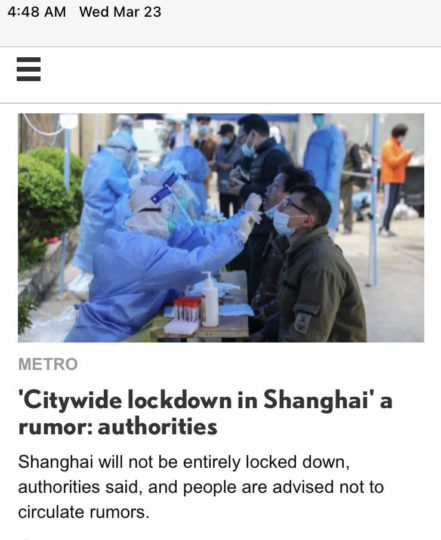
Cases continued to grow, and people got more and more nervous. Last week, as we were going to work in the morning, the subway station was eerily quiet. People weren’t taking the subway for fear of getting tagged as a “close contact” and hauled off to a quarantine center.

Panic buying of food (not toilet paper). We had been advised a long time ago to have two weeks’ worth of food on-hand, so our pantry was pretty well stocked.
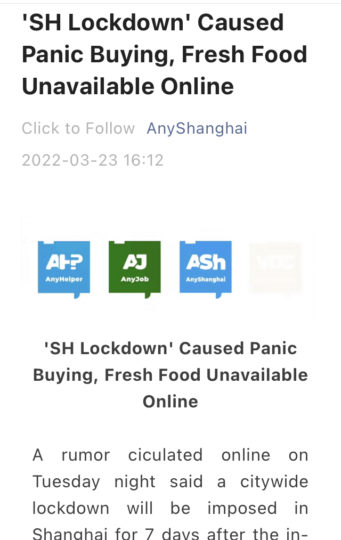
Still, the government denied that a lockdown was coming. The narrative was that the city, as the financial heart center of the country, the most modern city in China, the “magic city” was somehow different. To use a term from a decade ago, Shanghai was too big to fail.

The day after this story came out, we had this announcement. Shanghai would lock down in two steps.

Not an April Fool’s joke, our lockdown started on Friday the 1st. Our apartment building told us that we were confined to our apartments. And that’s where we are now. We can only leave the apartment when we are shepherded to the testing centers.
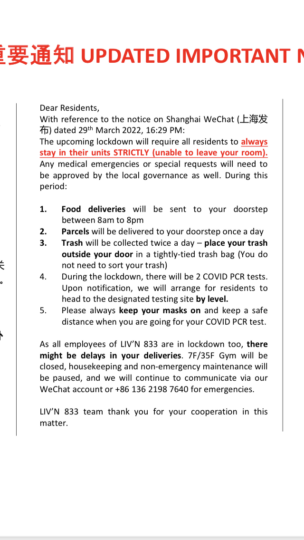

We were herded to the testing center on Friday morning.


Everyone has to register their cell phones with the government. All of our health information is in the cloud, and must be presented on-demand, usually when we enter office buildings and shopping centers.

In theory, the lockdown of this half of the city will last for four days, until April 5. I suspect that few people believe that. The other half of the city, which began lockdown last week, was scheduled to be opened back up two hours after our lockdown began. It is still locked down.
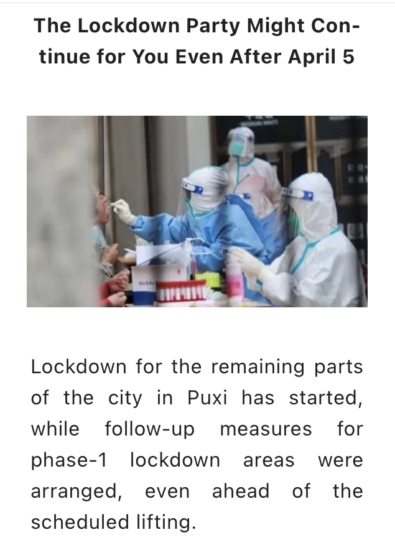
So, we wait. We have plenty of food. Our pantry is well-stocked, but our refrigerator is pretty small. We’re storing some vegetables in a bathroom sink.

While we are locked down, we can’t go to the office. We can’t hold our programs. We can’t with our counterparts in the local government. No one can say how long this will last. I’m not diplomatting, and I hate that.
That was a throwaway line in a TV show that I saw a long time ago. I don’t think it was meant to be a profound statement of truth, but it really resonated with me. Because it’s true, to some extent, at least for me. I think about my past quite a bit, especially the bad times. I try to draw lessons from those experiences, insight that will help me do better in the future. But it isn’t easy.
Today is a strange anniversary for me. It’s hard to believe it’s been ten years since I was pushed out of the nest. Ten years ago, I lost a job that I loved, at a place I had planned to stay for the rest of my working life. But the job ended, suddenly and without warning. As a result, I was forced to reevaluate myself, to move in a new direction. I had to to leave my comfort zone and reinvent myself. It was a painful period in my life. But I got through it. I have since moved on, and not only to a different job. In many ways, I have an even more meaningful and fulfilling life now. But of course at the time, I didn’t know how things would work out. At the time, it was devastating.
Having the rug suddenly, unexpectedly, and unceremoniously yanked out from under my feet left a mark. I won’t rehash the unfortunate circumstances that made me leave my job at the university (for context, you can read the open letter that I wrote). It was a life-changing experience. The process of adjusting to my new reality, trying to get back on track, looking for a job, was stressful and frightening. We had a mortgage. Our older son was just about to start college, and our younger son was still in high school. We didn’t know what would happen. We didn’t know if I would be able to get a job that would maintain our lifestyle, if we could keep our house, if we could keep our son in school. As we were trying to move forward through this scary time, my wife cried, more than once, out of worry for our financial stability, for our future. I lost a lot of sleep, too. It was a low point in our lives.
We’re in a good place now, but it took some time and effort to refocus and rebuild. It took some sacrifice, too. I had to take a job that was not nearly as prestigious. But it supported my family, and was a good bridge to my current career.
It’s easy to look to the past, and it can be useful to reflect, but you have to do it the right way.
My past is meaningful to me, but is my past more important than my future? Maybe it can be, but maybe it shouldn’t be. We carry memories of our past with us as we move through life. In that way, our past is always with us. For better, but more often, and too often, for worse. It should be that we use our happy memories, the memories of our successes, to prop ourselves up, make us believe in ourselves. That perfect test score, that time when we made someone smile, the time we won the foot race, the births of our children. Those memories should make us feel confident, give us inspiration and courage to take a chance or to be bold. But it doesn’t always work that way. Sure, the good memories are here, but the bad memories seem to have extra power. Stupid choices that we made, times when we made fools out of ourselves, when we did and said things that we are ashamed of. Those memories can dominate our thoughts, casting shadows of doubt on our confidence, sometimes on our self-esteem. Memories of bad times seem to be more vivid, more prominent. They’re the first things that pop into our minds, especially when we have a setback. Self-doubt and the resulting blow to our self-confidence make us our own worst enemies.
Yes, my past is important, and I try to learn from it. But right now, I choose to make my past less important than my future. A ten-year anniversary is also a good time to look to the future. This year I turned 56. My current career has a mandatory retirement age of 65. In ten years, I will have already retired. That reality might be stressful for some people. To me, it’s liberating. I know that my family will be financially stable after we retire. I don’t have to worry about money. I can focus on how I want to use the remaining time that I have in my career. On the experiences I want to have, on how I can help my coworkers, friends, and the people in the countries where I work. In ten years, when I am retired, I want to look back on the memories that I’m building now with a sense of satisfaction. I want to be lifted up by happy memories, not weighed down by regrets.
Rather than struggling with unhappy memories about the past, I’m focusing on my future. I’m doing everything I can to make my future memories as rich and uplifting as possible. The past is written, it can’t be changed. The future is full of possibilities, and that is where I’m putting my attention. My future is more important to me than my past.
“Everybody out, now, go!”
My supervisor waved everyone toward the exits, as he rushed around the office, locking all the doors and securing all of our materials. I grabbed all of my stuff, made sure that I had my mask on, checked that everyone on my team got the message to leave, and rushed out of the building. People from other offices in the building were also scrambling to get out as fast as they could. No one was panicking, everyone was calm, but they all showed the same urgency to get out of the building. No one wanted to get stuck inside.
A few years ago, I took the special training course that the State Department requires for all diplomats posted overseas. The official name is “Foreign Affairs Counter Terrorism,” or FACT. We call it “crash-bang.” It’s a week-long course held at a military base, and it prepares us for when things go horribly wrong while posted overseas. Among the modules are defensive driving. We got to crash cars into other cars. It was incredibly fun. The first aid section was stomach-turning for several people. Can you say “sucking chest wound?” We even got to practice crawling through a smoke-filled room, and climbing into a helicopter while wearing flack jackets and helmets. The training is serious and important; I know that people have saved their lives and others’ at post when things went south.
Stubbornly adhering to its zero-tolerance COVID-19 policy, the Chinese government is struggling to control the latest outbreak. The omicron variant has come to China, and just like in the rest of the world, its high infectious rate is causing outbreaks throughout the country. The absolute numbers are small. While the United States saw daily cases numbers in the hundreds of thousands, this week the new daily numbers are in the low thousands. But when your goal is zero, any new case is unacceptable. And there are consequences of this hard line. Local officials have lost their jobs because of their inability to control the spread of the virus. The local health authorities have seemingly absolute authority to control people’s movements and to implement lockdowns and mandate mass testing. All of which we are seeing in China this month.
I don’t know exactly what’s happening in Shanghai now. There isn’t a lot of objective, clear news. And the policy seems to be shifting. In recent weeks, we saw several cases of businesses being locked down, and anyone who happened to be inside when that happened had to get comfortable. They were stuck there for 48 hours while they were tested twice before being released (if their tests were negative, of course). This has happened to people that I work with. The father of one of my coworkers was identified as a “close contact” of a confirmed case. That meant that he was carted off to a quarantine facility, which in this case was a hotel room. He’s confined there for 14 days, while getting tested twice a day, every day.
There is a silver lining to the increasing numbers of COVID-19 infections in China, though. Just like in the rest of the world, although omicron is more contagious, it’s much, much less severe. Although infections are up in China, deaths aren’t. And the vast majority of confirmed infections are asymptomatic. COVID-19 simply isn’t having a large impact on people’s health.
People aren’t afraid of getting sick anymore, which is good. But they are afraid of getting caught up in the government’s unrelenting zero-tolerance measures, which have not yet changed. And the current approach has an enormous impact on people’s lives.
The reason that my supervisor rushed everyone out of the office was because he got word that our building was going into lockdown. This is happening all over the city. Once a building is locked down, no one can leave until the health authorities say so. One of my coworkers was called home in the middle of the day last week, because someone who lives in her apartment building was a close contact of a close contact. Once she returned home, she couldn’t leave her apartment for three days. She had to have two negative tests before she could return to work. Another coworker received the same notification. She has already been tested four times, and she still hasn’t been given the green light to leave her apartment. Today is day seven for her.
The reason everyone was eager to leave the building was that no one wanted to be locked down. Getting locked down anywhere is bad, but being locked down in the office is much worse than being locked down in your own house.
Back in normal times, pre-COVID, we were encouraged to prepare a “Go Bag” in our house. In the case of a sudden emergency, if we had to leave in a hurry, we should have a bag with a change of clothes, our passports and important documents, etc. If we were being evacuated, we could grab the bag on our way to the airport. Now, we are told to have a “Stay Bag” in the office, with a change of clothes and other necessities. Last week I bought a sleeping bag to keep in my office. I wasn’t the only person with that great idea, and I know that, because now there’s a nation-wide shortage of sleeping bags.

Sure enough, the building where I work is now in lockdown, so I can’t go to work today. Yesterday, we heard another rumor that my apartment building would be locked down today. We haven’t heard anything yet, though. In theory, we can go outside and walk around. But no one wants to enter a store, because once you’re inside somewhere, there’s a chance that you could be locked in.
China is experiencing a strong case of deja vu. Is it 2022, or 2020, too?
I received an email from the Foreign Service Institute’s language testing unit. They did a routine review of my recent language test, and adjusted my score up. My speaking score is now a solid 4, up from 3+. That means a little more language incentive pay, but more importantly, that means that I’m on the right track to improve my language skills.
I’ll still test again in six months, to try to improve my reading score. I’m confident that I can do it.
A year has gone by now, and even though I still can’t talk about it without choking up, I can write about it. This happened when I was a consular officer in Bangladesh.
The Rohingya are an ethnic minority in Burma. Because of religious violence against them, one million of them have fled into Bangladesh. This is a festering humanitarian crisis. Bangladesh is a poor country that is barely able to feed its own people. The addition of a million additional people in need of basic life support is a burden that the country can’t endure. Humanitarian aid is keeping them alive, but no one has been able to offer a workable solution yet.
The issue of refugee resettlement is political and emotional. If I were a refugee, I’d want to return to my home country. But that isn’t always possible. In the case of the Rohingya, the government of Burma refuses to acknowledge their citizenship. They are literally stateless.
The United States, like many countries, allows reunification of refugee families if one member of the family has resettled legally in their country. I was able to help a Rohingya refugee join her husband in America.
It might surprise you to know that the United States isn’t even in the top ten among countries that accept refugees. Would you believe that Iran and Ethiopia each accept more than ten times the number of refugees that the United States does?
Even though there’s a legal mechanism to resettle refugees in the United States, there are all kinds of legal and bureaucratic obstacles. The Rohingya crisis created some political obstacles as well, which I don’t want to try to explain, since I barely understood them at the time, and still don’t. Long story short, we had to get the Bangladesh government to agree to allow this one refugee to exit the country and get on an airplane to the United States. Getting one person out took more than a year. It took emails, phone calls, Congressional inquiries, in-person meetings with local government officials, security checks, medical examinations. The United Nations was involved, of course. I learned a lot from the experience, but all through the process, we were communicating with this young woman, and that put a human face on the process. This was a human being, and we were trying to help her get out of hell, and to build a new life.
Finally the day came when all the pieces came together. We had the entry visa, the medical and security clearances, coordination with the local authorities, and the airline. Even though everyone involved had given their approval, there was no guarantee that there wouldn’t be complications. I and a local staff member went to the airport with her, to help her navigate all of the steps. We went six hours before the flight was scheduled to leave. We got special airport passes that let us go through security, and right up to the boarding gate. I wanted to see her get on the airplane, and watch it take off, before I could relax.
Airlines in general don’t know what to do with refugees’ resettlement paperwork. Stateless refugees don’t have passports. The U.S. government uses a special form, but it isn’t the passport and visa that the airline is required to verify. Luckily, I had a good relationship with the airline, after working closely with them on the evacuation flights earlier in the year. I had given them the heads-up that this was happening. Still, the people working the airline counter hadn’t been informed. We explained the situation, but they had to double-check with their supervisors, because they’d never encountered a case like this. I think it helped to have an American officer there to explain the situation and assure the airline that she had permission to enter the United States. The check-in process proceeded.
Her luggage was overweight.
There was a $65 charge for the excess baggage.
Stateless refugees don’t have credit cards.
I was sure as hell not going to let a $65 luggage charge derail the 18 months of work to get that far along. Without hesitation, I whipped out my credit card and covered that charge. This was not an authorized expense, and I will never see that money again. But it was a very, very tiny price to pay to make sure that we could see this though, and reunite this woman with her husband.
The next step was passport control. That required another side trip to the airport police office, and several long phone calls with the higher-ups. I had my phone out, ready to call my contacts in the foreign ministry in case they needed to remind the airport authorities that she had permission to leave without a passport. But eventually they got it worked out. Seeing them stamp her paperwork was a huge relief. A stamp on the paperwork meant that the political obstacle was overcome.
Waiting in the departure lounge until boarding time and wheels-up was a stressful experience. Boarding the plane required another passport check, which required the gate agent to be aware of this special situation. But finally, she was allowed onto the plane, and I waited until wheels-up before leaving the airport.
This was the first time that a Rohingya refugee was allowed to be resettled to the United States in years. The process was an enormous lift, that took international and interagency coordination. My diplomatic skills were put to the test. It was a long, long day in the airport. For me, though, it was worth it. We didn’t just help a person that day, we changed her life.
The next steps are hers, and they will be hard. She now has to learn yet another language, adapt to a new culture, and accept the fact that she will probably never see her home country again. She isn’t a refugee any more, but she’s still an exile. But there’s no doubt in my mind that her life will be better. Because of what I and my team did. I am as proud of the work we finished that day as anything that I’ve done as a Foreign Service officer, and maybe as a human being.
The local government has adopted a “zero tolerance” policy regarding the COVID-19 pandemic. They’re convinced that their approach to controlling the spread of the virus has been proven correct. They point to the very low numbers of infections in China. They consider that to validate their strict social control measures. In contrast, they point to what they consider to be an out-of-control situation in the West.
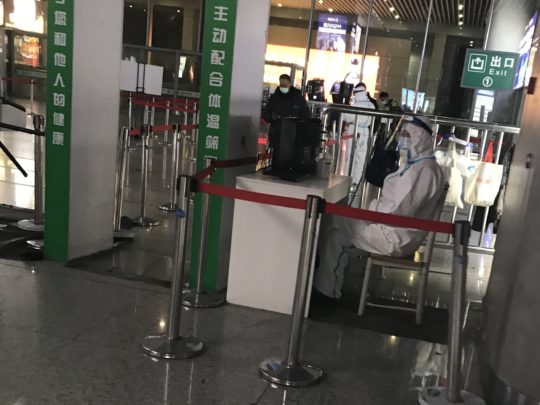
It’s impossible to ignore the wide difference in transmission numbers that result from China’s approach. There is no doubt that China is controlling the spread of the virus much more successfully than other countries are.
Everything comes at a cost, of course, and China’s success in controlling the pandemic is no exception. The cost is borne by the local people. They have to deal with limitations and restrictions that disrupt their lives, in little and not-so-little ways.
A coworker told me yesterday that the city has cancelled all large, in-person events through the end of the year. All concerts, parties, exhibitions, graduation ceremonies, celebrations, have been moved to online and virtual formats. Many schools are back to holding classes online, too.
Travel has also taken a hit. When people travel, the virus travels, too. We’ve had to cancel many official trips within the country. We can take personal trips, but there’s a huge risk. If you travel outside the city, and an outbreak is discovered (“outbreak” in China means the number of confirmed cases is more than zero), the place where you are traveling to could be locked down. Your long weekend trip could be extended by 14 days, locked inside a crummy quarantine hotel. Which you have to pay for.
Although we really wanted to do more in-country travel, the risks are too high. We aren’t worried about getting sick: we’re triple-vaccinated. But in China, when an area gets locked down, no one gets in or out, regardless of vaccination status, nationality, or color of your passport. The danger of getting sick is pretty small, but the risk of massive inconvenience and disruption to our lives is quite high.
Luckily for us, we’re in Shanghai, where there’s a lot to do, see, eat, hear, experience. There is no danger of getting bored in Shanghai. The staycations that we are planning are pretty great. But the psychological effect of knowing that we have to stay in the city deducts some of the fun. Although it isn’t a bad thing, we’re stuck here.